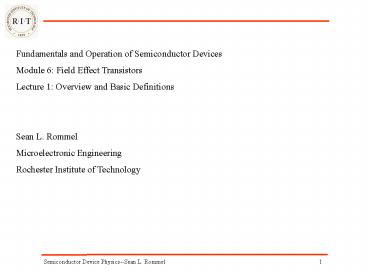Module 6 Lecture 1 - PowerPoint PPT Presentation
1 / 21
Title: Module 6 Lecture 1
1
Fundamentals and Operation of Semiconductor
Devices Module 6 Field Effect Transistors Lecture
1 Overview and Basic Definitions Sean L.
Rommel Microelectronic Engineering Rochester
Institute of Technology
2
Field Effect Transistor
Performance Outcomes
- Describe the physics underlying Field Effect
Transistor operation - Explain the role of the source, drain, gate,
and substrate contacts - Identify and explain the subthreshold, linear,
and saturation regions of a Field Effect
Transistor - Characterize the interaction between the
surface potential and channel potential - Explain the meaning of a Long Channel Vs. Short
Channel Device. - Explain and characterize short channel effects
in a Field Effect Transistor - Explain the interaction of critical device
parameters when scaling transistors from
generation to generation.
3
Field Effect Transistor
- Properties of Field Effect Transistors
- MAJORITY Carrier device
- Unipolar
- Gate voltage modulates channel resistance
- Modulate W (JFET, MESFET, HEMT)
- Modulate Conductivity (MOSFET)
4
Field Effect Transistor
- For a fixed gate voltage, we observe a
NONLINEAR I-V Characteristic.
5
Field Effect Transistor
- If we apply a gate bias, the resistance of the
channel is modified.
In this case, the channel resistance decreases
with increasing gate bias.
6
Field Effect Transistor
A Generic Field Effect Transistor
- High input impedance from gate to channel.
- Depending on Gate Voltage, the resistance of
the channel may be large or small!
7
Field Effect Transistor
A Generic Field Effect Transistor
Source (S)
Supplies carriers to the drain.
Defined electrically to be the GROUND or COMMON
lead.
8
Field Effect Transistor
Drain
Symmetrical to Source.
Attached to Power Supply, creates a potential
(Vy) across the channel to accelerate carriers.
9
Field Effect Transistor
Gate
Control the resistance of the channel
Case 1) High Channel Resistance gate voltage too
low.
10
Field Effect Transistor
Gate
Control the resistance of the channel
Case 2) Low Channel Resistance gate voltage
above threshold
11
Field Effect Transistor
- In general, the DC I-V characteristics of a FET
look are characterized by four regions
Saturation
Linear
12
Field Effect Transistor
- One must consider whether a device is operating
in Enhancement or Depletion Mode. - An enhancement mode device is normally off, and
requires a gate voltage to turn the channel on. - A depletion mode device is normally on, and
requires a gate voltage to turn off (pinchoff)
the channel.
13
Field Effect Transistor
14
Field Effect Transistor
FET
- If we look at a FET as a black box we find
the first order equivalent circuit.
- Later in this module, we will modify the SPICE
model to take other factors into account.
15
Field Effect Transistor
After a Taylor Series expansion maintaining only
the first order terms,
16
Field Effect Transistor
The pre-factors of the AC voltage are very
interesting quantities!
17
Field Effect Transistor
Channel Conductance
- The transconductance represents the incremental
change in the drain current as a function of the
drain voltage.
- Obtained for a FIXED GATE VOLTAGE.
Transconductance measures how well the drain
modulates the current
18
Field Effect Transistor
Transconductance
- The transconductance represents the incremental
change in the drain current as a function of the
gate voltage.
- Obtained for a FIXED DRAIN VOLTAGE.
Transconductance measures how well the gate
works!
19
Field Effect Transistor
Transconductance in Saturation
- One final benchmark is the transconductance in
saturation.
We will observe that the speed of the Field
Effect Transistor is directly proportional to the
transconductance.
20
Field Effect Transistor
We will define these quantities in terms of
material parameters in the sections which follow.
21
Field Effect Transistor
Review Questions
1.) What is the role of the source, drain, and
gate of a field effect transistor?
2.) What are the two methods in which a gate may
control the channel of a FET?
3.) What are the two critical potentials used to
describe FET operation?
4.) What is the meaning of transconductance and
drain conductance?
5.) What is the difference between an ehancement
mode and a depletion mode device?































